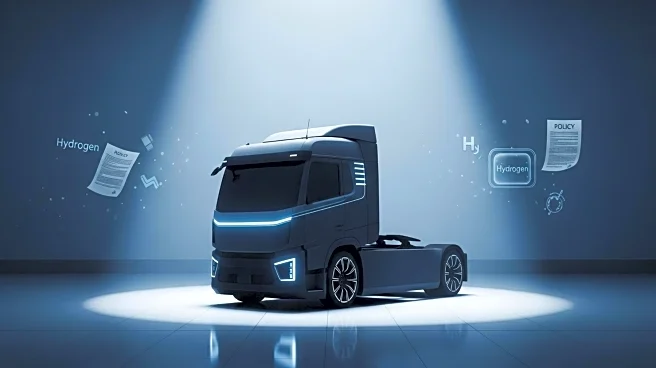What is the story about?
What's Happening?
The U.S. electric truck market is experiencing a significant downturn, with only 200 electric trucks sold in the first half of 2025, marking an 80% decrease from the previous year. This decline is attributed to policy reversals, cancelled sales mandates, and stalled waivers, leaving the domestic market in uncertainty. Meanwhile, hydrogen fuel cell trucks are not filling the gap, as the collapse of companies like Nikola and Hyzon has diminished the prospects for hydrogen technology in freight trucking. Globally, the market is shifting towards battery-electric trucks, with nearly 90,000 zero-emission trucks sold in the first half of 2025, 97% of which are battery-electric. This trend is particularly strong in China and Europe, where electric truck sales are surging due to supportive policies and infrastructure development.
Why It's Important?
The decline in U.S. electric truck sales and the stagnation of hydrogen technology have significant implications for the country's efforts to decarbonize transportation. The lack of progress in adopting zero-emission trucks could hinder the U.S.'s ability to meet climate goals and reduce emissions from the freight sector. As other regions, like China and Europe, advance in electric truck adoption, the U.S. risks falling behind in the global transition to sustainable transportation. This could impact the competitiveness of U.S. manufacturers and the broader economy, as the market increasingly favors battery-electric solutions over hydrogen fuel cells.
What's Next?
The U.S. may need to reassess its policies and incentives to stimulate the electric truck market and support infrastructure development. Stakeholders, including policymakers and industry leaders, might consider revisiting sales mandates and waivers to encourage adoption. Additionally, investment in charging infrastructure and battery technology could be crucial to reviving the market. As global trends continue to favor battery-electric trucks, the U.S. must adapt to remain competitive and align with international decarbonization efforts.
Beyond the Headlines
The shift away from hydrogen trucks highlights broader challenges in the energy transition, including the need for viable infrastructure and cost-effective solutions. The failure of hydrogen technology in freight trucking underscores the importance of aligning technological advancements with market realities and economic viability. This development may prompt a reevaluation of hydrogen's role in other sectors and encourage a focus on scalable and efficient technologies like battery-electric systems.
















